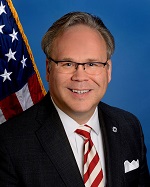 Lobby of the NCUA.
Lobby of the NCUA.
The NCUA on Thursday unveiled a new process designed to make chartering new credit unions easier.
The NCUA's new Charter Application Guide and other resources were created to assist people who want to bring federally insured financial services to their communities by starting an entirely new — or de novo — federal credit union.
Recommended For You
"Along with increasing access to safe, fair and affordable financial products and services for credit union members, there is a real need to make the process for starting a new credit union less daunting," NCUA Chairman Todd Harper said. "Organizing a new credit union takes time, resources and commitment. A clear, step-by-step roadmap for applying for a federal charter helps organizers lay a foundation for success."
The new guide was developed as part of the NCUA's Advancing Communities through Credit, Education, Stability, and Support (ACCESS) Initiative.
Launched in 2020, this initiative was designed to foster greater economic equity and justice through the modernization of regulations, policies and programs that support financial inclusion within the NCUA and, more broadly, throughout the credit union system. A key part of ACCESS is supporting the development of new credit unions.
Harper thanked all at NCUA who worked on the project, including NCUA Board Member Rodney E. Hood "for getting the ball rolling through the ACCESS Initiative," and to Vice Chair Kyle S. Hauptman for "his steadfast focus on new charters."
 Todd Harper (Source: NCUA)
Todd Harper (Source: NCUA) Hauptman said the chartering process has been one of his top three priorities and the guide is an example of the NCUA "truly 'walking the talk' when it comes to financial inclusion."
"If we force a community to jump through unnecessary hoops or make them wait even one day longer than needed, the NCUA isn't living up to its own ideals."
Hood said the guide is a significant step, but more lie ahead. "In the months ahead, I look forward to working with my board colleagues to do even more to significantly streamline and simplify the process of chartering," Hood said.
One next step is a webinar the NCUA is hosting 2 p.m. EDT Wednesday, May 4, to provide information to people interested in starting a new federal credit union on the process and requirements. Registration for the free, hour-long webinar is at this link.
During the hour-long webinar, staff from the NCUA's Office of Credit Union Resources and Expansion will explain the charter process, discuss the new guide and introduce other resources.
NAFCU and CUNA have been encouraging a simplification of the chartering process. Last July, CUNA President/CEO Jim Nussle sent a letter to Congress supporting a bill intended to clear unnecessary regulatory obstacles hindering the creation of new credit unions and other financial institutions.
Nussle wrote that the number of de novo credit unions has fallen from an average of 7.7 per year before the Great Recession of 2007-2009 to an average of 2.2 per year since the implementation of the Dodd-Frank Wall Street Reform and Consumer Protection Act of 2010.
Dodd-Frank was a sweeping overhaul of regulations on banks, credit unions and other financial institutions enacted in response to the 2007 financial meltdown triggered by lax regulations of financial institutions, particularly asset-backed securities where the assets were bundles of high-interest, high-risk mortgages.
"Chartering a credit union is a time-consuming and complex endeavor — including identifying capital sources, determining field of membership, developing a business plan, appointing a board of directors," Nussle wrote. "(The) NCUA offers consulting services at no cost once a preliminary field of membership is approved. But, it can still take three years, or even longer, to receive a charter."
Regardless of the complexity of gaining a charter, small credit unions face a challenge surviving and many are acquired each year by larger institutions. As of Dec. 31, nearly three-quarters of the $2.08 trillion in assets of the nation's 5,048 credit unions were controlled by the 411 with assets of $1 billion or more.
Since the start of 2019, the NCUA has chartered seven de novo credit unions:
1. Unity of Eatonville Federal Credit Union of Eatonville, Fla., six miles north of Orlando was granted its charter last December. It has a low-income designation, and will primarily serve people who live, work, worship, attend school, or participate in programs to alleviate poverty or distress in the Eatonville community. Harper called the charter a milestone. "Eatonville was incorporated in 1887 and was one of the first self-governing, all-Black municipalities in the United States." It has not yet filed a Call Report.
2. Capital Federal Credit Union in Lubbock, Texas ($6.1 million in assets, 29 members as of Dec. 31) was granted a charter Oct. 21, 2021 to serve a multiple common-bond field of membership that includes: Employees of Capital Mortgage Services of Texas; members of the League of United Latin American Citizens in Lubbock; Texas Council #263 and an underserved portion of Lubbock County consisting of 39 census tracts.
3. Community First Fund Federal Credit Union of Lancaster, Pa. ($3 million) was chartered in July 2021 to serve the 550,000 people of Lancaster County, about 80 miles west of Philadelphia. It had gained 60 members by March 31.
4. Maun Federal Credit Union in Kendall Park, N.J. ($708,871, 38 members) was chartered April 26, 2021, to serve a local Islamic community.
5. Growing Oaks Federal Credit Union of Goldsby, Okla. ($2.5 million, 88 members) was chartered Aug. 7, 2020, to serve four counties in the state.
6. Maine Harvest Federal Credit Union in Unity, Maine ($2.9 million, 74 members) was charted Aug. 14, 2019, to serve the employees and 13,000 members of the Maine Organic Farmers and Gardeners Association and the Maine Farmland Trust.
7. Otoe-Missouria Federal Credit Union of Red Rock, Okla. ($2.2 million, 470 members) was chartered in May 2019 to serve the 4,200 members and employees of the Otoe-Missouria Tribe as well as 17 tribal-owned businesses.
© Touchpoint Markets, All Rights Reserved. Request academic re-use from www.copyright.com. All other uses, submit a request to [email protected]. For more inforrmation visit Asset & Logo Licensing.







